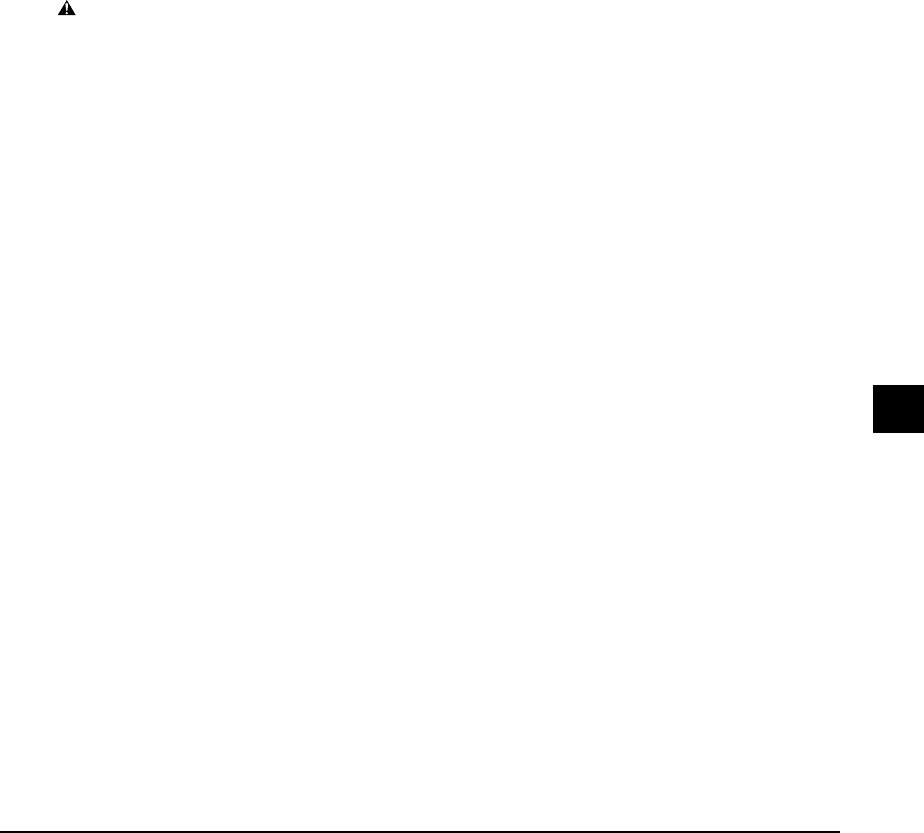
Chapter 12 Troubleshooting 12-13
12
Troubleshooting
“?” is printed in the index.
Yellow “?”: The photograph data is large. Printing of this photograph may take a long time when
printing in single frame, frame range, or all frame mode.
Red “?”: The photograph data is damaged and cannot be printed on your machine.
Cannot write to the memory card (write protect error displayed in Windows).
1. Is the machine in photo print mode and the <CARD PROTECT> setting set to <ON>?
Switch to a different mode and set the <CARD PROTECT> setting to <OFF> ( p. 4-15). Then turn the
machine off and on again.
2. If a delayed write failed error is displayed in Windows 2000. Is the machine in photo print mode and
the <CARD PROTECT> setting set to <ON>?
Switch to a different mode and set the <CARD PROTECT> setting to <OFF> ( p. 4-15). Then turn the
machine off and on again.
If you want to enable card protection, set the <CARD PROTECT> setting to <ON> ( p. 4-15). Then turn the
machine off and on again.
CAUTION
• In Windows 2000, if you set the <CARD PROTECT> setting to <ON>, turn the machine off then on
again. If you copy data from the hard disk to the memory card and a delayed write failed error
occurs, the original file may be lost.
3. Have you connected in Windows XP?
The date and time of access is written in the Windows XP preview, and if <CARD PROTECT> is set to <ON>
or photo print mode is selected, a write protect error may be displayed. Turn the machine off then on
again.
Removable disk does not appear in Windows Explorer.
This behavior can occur if you map a network drive to the next available drive letter after the local
volumes and CD-ROM drives have been assigned drive letters. Do the following if you experience
this problem:
1. Assign the network drive to any other drive letters.
2. Restart your computer.
The [Unplug/Eject] icon does not appear (Windows 2000).
In Windows 2000, the [Unplug/Eject] icon does not appear even when you select [Show Unplug/
Eject icon in the taskbar] in the [Unsafe Removal of Device] dialog box that is displayed when you
turn off the machine or disconnect the USB cable.
You do not need to use the [Unplug/Eject] icon when you turn off the machine or disconnect the
USB cable.
The machine does not appear in [Hardware devices] in the [Add/Remove Hardware]
dialog box (Windows 2000).
In Windows 2000, the machine does not appear in [Hardware devices] in the [Select Device to
Unplug] dialog box in [Add/Remove Hardware] of [Control Panel].
In Windows 2000, the [Unsafe Removal of Device] dialog box will appear when you turn off the
machine or disconnect the USB cable, and the message [To safely unplug or eject any of the
following devices, first use the Hardware wizard in the Control Panel to stop the device] will appear.
There is however no need to unplug a device with [Add/Remove Hardware] when you turn off the
machine or disconnect the USB cable.


















